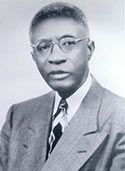Dr. George Patrick Alfonso Forde
Dr. George Patrick Alfonso (G. P. A.) Forde, described by Dr. Blanchard Hollins as a “pioneer” and “classy” physician, was native of Barbados. Dr. Forde worked in a Panama Canal hospital before coming to the United States to attend Meharry Medical College in Nashville, Tennessee. He finished first in his class at Meharry in 1913.
Houston native and lawyer Carter Wesley persuaded Dr. Forde to move to Houston in 1927. Forde decided to move his family to Texas primarily because of the unique opportunities provided by the Houston Negro Hospital. His prior residence of Muskogee, Oklahoma offered no hospital in which African-American physicians would practice medicine. As a general practitioner, Dr. Forde worked at both Houston Negro Hospital and St. Elizabeth’s hospital.
Dr. Forde made several contributions to the health of Houston. He worked at the Negro Child Center, stayed involved in public health, helped train nurses from Prairie View A&M at Jefferson Davis Hospital, and served as an active member of the Houston Medical Forum (HMF).
On several occasions he spoke on health issues before fellow members at the HMF meetings. Dr. Robert Bacon recalls that following a speech on rheumatic heart disease (in which an inflammatory fever weakened a heart valve), the chief of cardiology at Methodist Hospital told the audience, “Now, gentlemen, never in your life will you hear a more comprehensive, a more complete, a more thorough explanation of rheumatic heart disease than what you heard tonight. I have learned a few things.” 1
In the words of his daughter, Gladys Forde, “the black physicians did a great deal to elevate the healthcare status…of those persons treated.” 2 Dr. G.P.A. Forde died at the age of 84 in St. Elizabeth’s Hospital in 1967.
Next Biography: Dr. Joseph Clayton Gathe
Return to: Conclusion
Return to: Houston – A Place to Practice
Citations
- Dr. Robert Bacon, Interview by Kathleen A. Brosnan, March 28, 2007.
- Dr. Gladys Forde Interview


